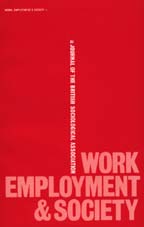Article contents
EMPLOYMENT EXPERIENCE AND ORGANISATIONAL COMMITMENT: AN EAST-WEST EUROPEAN COMPARISON
Published online by Cambridge University Press: 01 December 1999
Abstract
This paper compares the level of organisational commitment in three former state socialist societies (Bulgaria, the Czech Republic and Slovakia) with that in a market-based society (Britain). Among the former state socialist societies, Bulgaria represents the country that had remained closest to the patterns of work organisation that prevailed before 1989, whereas the Czech Republic and Slovakia had moved further towards marketisation. The analysis draws on data from nationally representative surveys of the workforce in the four countries. The results show that organisational commitment was lower in all of the former state socialist societies than in Britain, but that it was lowest of all in the societies that were more fully engaged in the transition to a market economy. There is evidence that the patterns of work organisation typical of state socialism did have the effect of lowering commitment, most importantly because of the way they restricted initiative and self-determination in work. However, it seems likely that this was exacerbated in the case of the transitional societies by sharper aspirations for work enrichment and by the greater unpredictability of organisational developments in a rapidly changing environment.
- Type
- Research Article
- Information
- Copyright
- © 1999 BSA Publications Ltd
- 6
- Cited by




